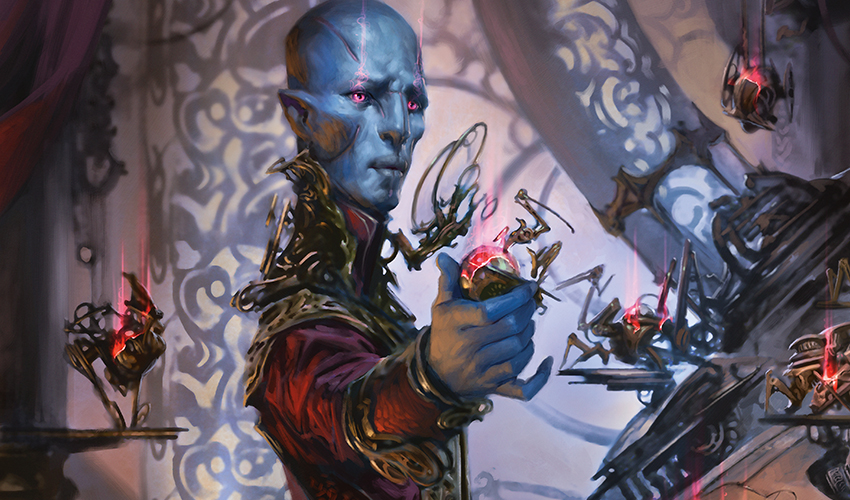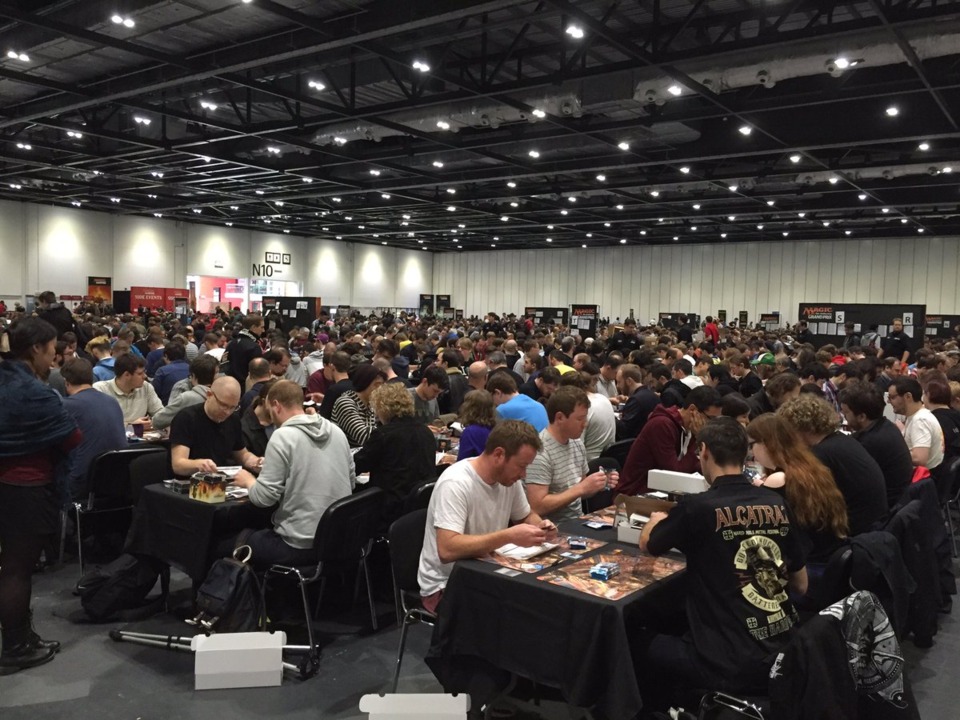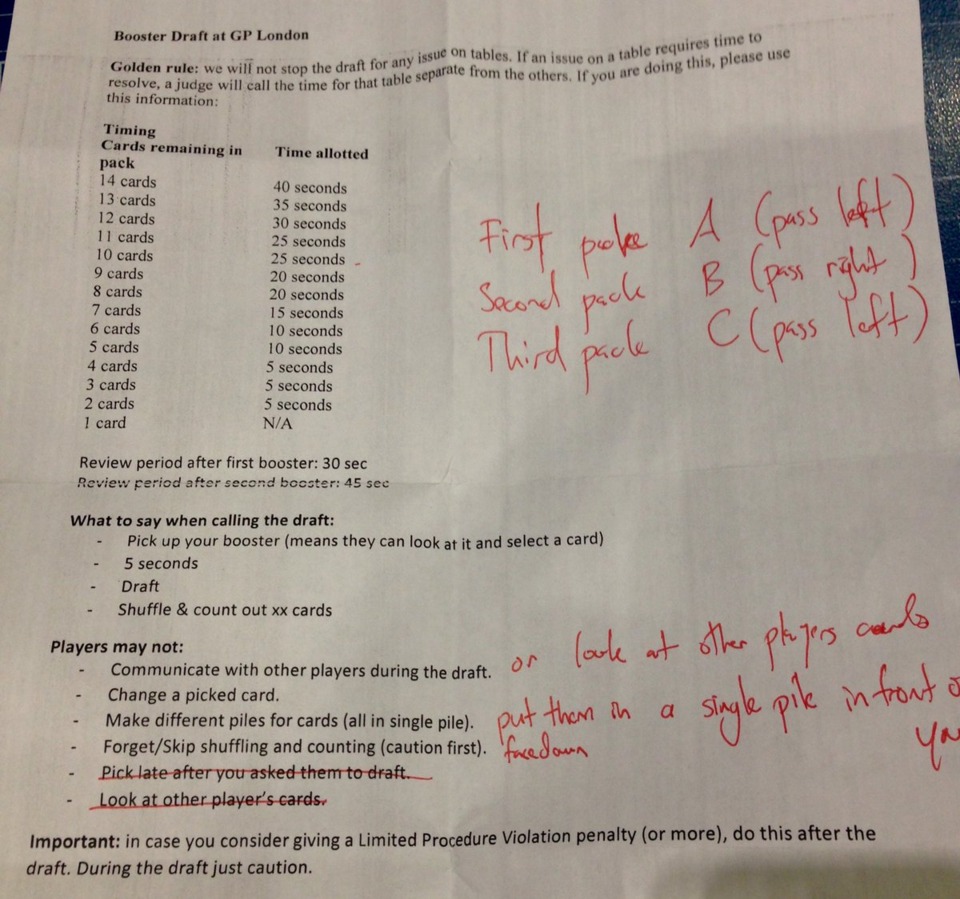The Enduring Success of Magic: the Gathering (and a Grand Prix London Tournament Report)
By dinocity 21 Comments

"Dovin Baan" card art by Tyler Jacobson
On a recent Bombcast, the crew discussed how Blizzard had built a successful business on taking existing games and improving/perfecting them with their own releases. A specific example given was how Blizzard's Hearthstone was an improved version of the trading card game formula that was created by Wizards of the Coast with their 1993 release of Magic: the Gathering. As someone who has played significant amounts of Magic in recent years, this comment frustrated me. However, I decided not write in because A: I didn't want to come across as being whiny and B: Their comments, while frustrating, were not entirely inaccurate.
Complexity has always been the greatest strength of Magic, but it has also been the game's greatest weaknesses. Myself and the 20+ million other players love how each game of Magic will often feel like you're solving a difficult puzzle, where you're trying to think several turns ahead in a bid to outmaneuver an opponent (or opponents, in some formats), while they are trying to do the same. Unfortunately, this doesn't translate especially well to the digital version of the game.
Magic: the Gathering Online was first released in 2002 and despite regular updates, the online client still feels clunky and dated in 2016. This is partly due to the complexity of the game necessitating a client that can handle lots of strange interactions during a game of Magic, but also partly due to the failure of Wizards of the Coast to properly address user complaints that tend to revolve around bugs and general performance issues. It is in this area where it is easy to see where the comments from the Bomb crew were coming from, as Hearthstone is a very similar game to Magic that works much better in the digital format.
Magic has also struggled cement itself on the fast-growing professional gaming scene, with live coverage of the big tournaments hosted by Wizards of the Coast often leaving a lot to be desired when compared to the most successful competitive games like League of Legends, Starcraft and Street Fighter.
Despite this, Magic is a game that has continued to gain in popularity throughout its 20+ years, even with various competitors coming and going during that time. It is the paper version of the game, played face-to-face with real life opponents where Magic is really in a league of its own. This is also where my own recent experience of the game has reaffirmed my love for it.
I recently attended a Magic: the Gathering Grand Prix event in London, these events are huge tournaments held across the world that also serve as Magic conventions that attract a large number of attendees. The main event of the London edition saw a whopping 2,566 players competing for the coveted Grand Prix champion title. I was one such player, as were my dozen or so friends that I had travelled to the event with.
The format of the tournament was Sealed, which means that rather than players showing up with a deck of cards they had constructed before the event, they would instead open six booster packs of cards at the event and these cards would serve as the "pool" of cards from which they would build a deck from. The day started with players opening the six booster packs of the most recent Magic expansion called Kaladesh in front of another player sat opposite them, who would then do the same. The players will then swap the cards opened with their neighbour and document the cards that their neighbour had opened, to ensure that no foul play could take place with players sneaking cards that they didn't open into their deck.

Players begin to open their packs in the main event.
I watched as the person sat across from me opened three rare and powerful cards from their booster packs and felt jealous as the pool of cards that I had opened was decidedly mediocre by comparison. I then set about assembling a cohesive strategy out of my pile of 84 cards. My deck ended up revolving putting powerful "vehicle" cards into play as well as creatures to pilot them to victory.
Match pairings for the first round were posted both online and on paper around the venue, leading to a mad rush of thousands of players eager to get to their seats and start playing. It was set to be a gruelling day of 9 rounds, each lasting 50 minutes, where only players with records of 6 wins or better would advance to the second day of the tournament.
I found my seat for my first round and as the beginning of play crept closer, I became increasingly concerned by the fact that the seat opposite me that should have been occupied by my opponent was instead empty. The round started and after 10 minutes and still no sign of my opponent, I alerted the nearest judge (volunteers that help to explain and enforce the often complicated rules of the game). The judge confirmed that my opponent was nowhere to be seen and signed my match slip, confirming that I had won the round by default. An annoying way to start the day, but a win is a win.
My opponent for the second round did show up, he was a friendly guy who had flown in from Latvia the day before to play in the tournament. After three tight games, he emerged victorious with a deck that had a very similar strategy to my own. It was disappointing that my first proper match of the tournament had ended in a loss, but there were many rounds still to play.
The day continued and I started to rack up a series of wins against opponents from all across the world (as well as one or two of my fellow Brits). I finally hit the fabled 6th win in the eighth round, against an opponent who had very courteously alerted a judge when he realised that he was playing with a card that should not have been in his deck, resulted in him being issued with a game loss in the best 2-out-of-3 match that I ended up winning
I ended the day with 6 wins and 3 losses, ensuring that I had qualified for the second day of competition along with 3 of my friends who had also achieved similar records. After 12 hours of play, the day was finally over and we headed off to a restaurant to grab some late dinner and talk about how some of our matches went. It was close to midnight when we finally got back to our accommodation to get some rest before another mentally taxing day of Magic.
The format for the second day was to be Booster Draft, which like the first day, involves players building decks from cards opened in packs of Kaladesh during the event. The difference to sealed is that players will instead sit at a table of eight and simultaneously open a booster pack, select a card to add to their deck and then pass the remaining cards from the pack to the opponent sat to their left. This will continue with players continually adding one card from the packs passed to them until there are no cards left to take. The second pack is then opened, and players will repeat the process, except they will pass the cards to their right this time. The process is repeated for the third and final pack with players passing to the left again.

Judge notes on how to manage 700+ players drafting cards at the same time.
After building our decks, the three rounds of the first booster draft of the day begun. I finished the draft with a respectable two wins and one loss, putting my record to 8-4. We then had a second draft followed by three more rounds of play. I finished the tournament with 10 wins and 5 losses across 15 rounds, my 3 friends all posted the same record. Sadly, this meant that none of us had come to close to the records of the top 8 players in the tournament, who would qualify for the single elimination rounds to fight it out for the Grand Prix Champion title as well as some considerable cash prizes.
The recurring theme of GP London is that every person I had came across throughout the weekend shared a passion for Magic: the Gathering. Everyone I encountered was friendly and sportsmanlike in their conduct, both in victory and in defeat. It was this that reiterated to me why Magic has been successful for as long as it has. Its regular expansions continue to feed an ever-growing legion of fans, who can play the game in a huge variety of different formats in settings ranging from casual encounters around the kitchen table to highly competitive matches for huge cash prizes. The game also has an ongoing story that is told through the cards, making every game feel like you're playing out part of the overarching plot.
This takes me back to the Bombcast comments I referred to at the beginning of this piece. Magic is a game not without its flaws and it can be frustrating to see other trading card games (particularly Hearthstone) handle certain aspects of the TCG formula better. Despite this, Magic is a game that has endured thanks to a strong community that has kept the game popular for many years already and will continue to do for many years to come.

Log in to comment